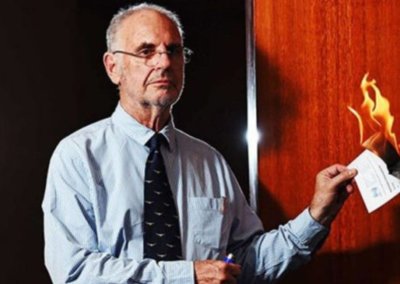A ‘suicide machine’ has passed legal review in Switzerland and its maker hopes it will be available for use as early as next year.
The 3D printed ‘suicide machine’ was created by Philip Nitschke, founder of the suicide advocacy group Exit International, proponent of ‘rational suicide’ and referred to in the media as ‘Dr Death’ or the ‘Elon Musk of assisted suicide’. It is being called the ‘Sarco’ machine.
In an interview with SWI swissinfo.ch, Nitschke said: “It’s a 3-D printed capsule, activated from the inside by the person intending to die. The machine can be towed anywhere for the death”.
“The person will get into the capsule and lie down… They will be asked a number of questions and when they have answered, they may press the button inside the capsule activating the mechanism in their own time”.
Describing the actual manner of death, Nitschke said: “The capsule is sitting on a piece of equipment that will flood the interior with nitrogen, rapidly reducing the oxygen level to 1 per cent from 21 per cent in about 30 seconds. The person will feel a little disoriented and may feel slightly euphoric before they lose consciousness. Death takes place through hypoxia and hypocapnia, oxygen and carbon dioxide deprivation, respectively”.
No legal issues to the suicide machine being used in Switzerland
The head of Exit International reports approvingly that there are “no legal issues” with the use of the ‘suicide machine’ in Switzerland.
Nitschke intends to de-medicalise the process of assisted suicide and “remove any kind of psychiatric review from the process”.
He says: “Our aim is to develop an artificial intelligence screening system to establish the person’s mental capacity. Naturally there is a lot of scepticism, especially on the part of psychiatrists. But our original conceptual idea is that the person would do an online test and receive a code to access the Sarco”.
Nitschke is not the first person to invent and promote the use of a suicide machine. In the 1990s, Jack Kevorkian built a “death machine” in his van and helped over 100 people commit suicide using it. In 1999, he was convicted for murder.
Assisted suicide often fails
While Nitschke suggests that death would take 5-10 minutes, physicians from countries that have already made assisted suicide and euthanasia legal tell a different story. Dr Brick Lantz, orthopaedic surgeon and state director of the American Academy of Medical Ethics, emphasised that it is not uncommon for an assisted suicide to go wrong.
“The failures are brutal when someone fails assisted suicide and the failures are not infrequent. In fact, there was one that woke up from a coma after multiple days. There was a nurse at the bedside of one who ended up putting a plastic bag over the patient to kill the patient because they weren’t dying”, he said.
Approximately 1,300 people ended their lives by assisted suicide in Switzerland in 2020. The majority of these were carried out by the country’s two largest assisted suicide groups Exit (no connection to Exit International) and Dignitas.
Right To Life UK spokesperson, Catherine Robinson, said: “This ‘suicide machine’ is like something out of a dark science fiction novel. Not only is he promoting suicide but he is also attempting to remove just about any minimal safeguards that one might think to introduce. The idea of doing an online test to assess mental capacity is so open to abuse that it should not be taken seriously”.
“It is surely a black mark against Switzerland that one of the things it is increasingly becoming known for is its trade in death”.












